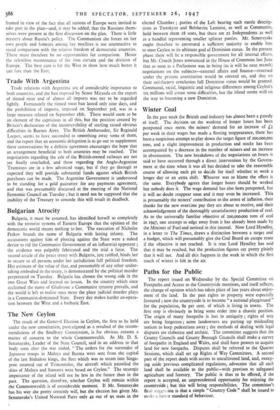Winter Coal
In the past week the British coal industry has almost been a parody of itself. The decision on the working of longer hours has been postponed once more, the miners' demand for an increase of £2 per week in their wages has made a fleeting reappearance, there has been a suspicious attempt to play down the target figure of 200,000,000 tons, and a slight improvement in production and stocks has been accompanied by a decrease in the number of miners and an increase in absenteeism. 1 he new breakdown of the negotiations on hours is said to have occurred through a direct intervention by the Govern- ment at the time when it was all but decided to take the reasonable course of allowing each pit to decide for itself whether to work a longer day or an extra shift. Whoever was to blame the effect is the same. Everybody agrees that longer hours should be worked but nobody does it. The wage demand has also been postponed, but it will no doubt reappear soon and it may even be increased. This is presumably the miners' contribution to the arrest of inflation, their thanks for the new overtime pay they are about to receive, and their acknowledgement of the thoroughly unsatisfactory production of coal. As to the universally familiar objective of 200,000,000 tons of coal in 1947, one attempt to edge away from it has already been made by the Minister of Fuel and noticed in this journal. Now Lord Hyndley, in a letter to The Times, draws a distinction between a target and a budget, which will presumably give the Coal Board an escape route if the objective is not reached. It is true Lord Hyndley has said that it may be reached, but the production figures say pretty plainly that it will not. And all this happens in the week in which the first touch of winter is felt in the air.


































 Previous page
Previous page